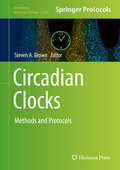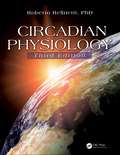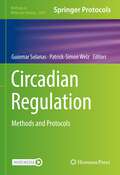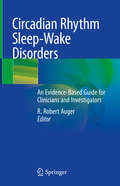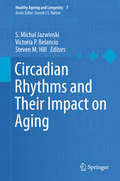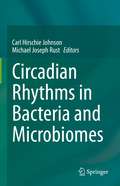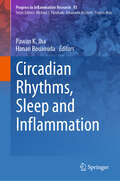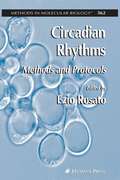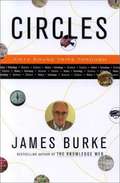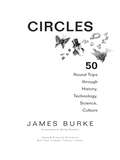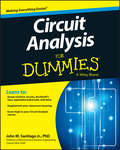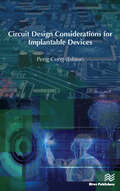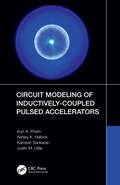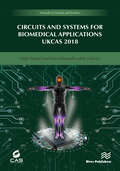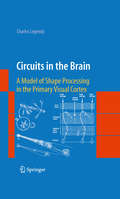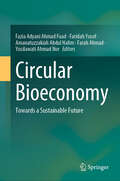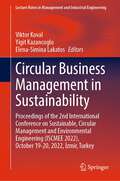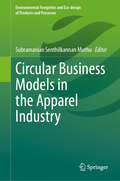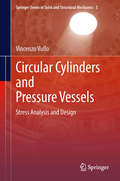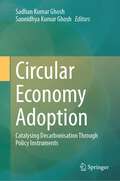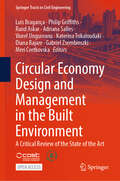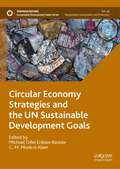- Table View
- List View
Circadian Clocks: Methods and Protocols (Methods in Molecular Biology #2130)
by Steven A. BrownThis volume presents techniques used by researchers from all branches of biology to study daily changes at a molecular level in many physiological systems. The chapters are organized into three parts and cover topics such as measuring and modeling physiological and behavioral rhythms; genome-wide analyses in circadian biology, and imaging and manipulating brain clocks. Written in the highly successful Methods in Molecular Biology series format, chapters include introductions to their respective topics, lists of the necessary materials and reagents, step-by-step, readily reproducible laboratory protocols, and tips on troubleshooting and avoiding known pitfalls.Cutting-edge and practical, Circadian Clocks: Methods and Protocols is a valuable tool for any researcher interested in learning more about this developing field.
Circadian Clocks: Role in Health and Disease (Physiology in Health and Disease)
by Michelle L. GumzThis book sheds new light on the molecular mechanisms that generate circadian rhythms. It examines how biological rhythms influence physiological processes such as sleep, hormone synthesis and secretion, immunity, kidney function, the cardiovascular system, blood pressure, and the digestive system. Clinical implications are considered while exploring the impact of rhythms on neuropsychiatric disorders and chronotherapy's potential for reducing cardiovascular risk. Offering a cross-section of expertise in both basic and translational (bench-to-bedside) research, this book serves as a guide for physicians and scientists who wish to learn more about the impact of circadian rhythms on physiological processes in health and disease.
Circadian Physiology
by Roberto Refinetti PhD.Circadian rhythms influence most of our life activities, notably getting up and going to sleep every day. This new edition of Circadian Physiology delves into the mechanisms surrounding how these rhythms work, the physiology and biology behind them, and the latest research on this cutting-edge field. The book also discusses a wide variety of practi
Circadian Regulation: Methods and Protocols (Methods in Molecular Biology #2482)
by Guiomar Solanas Patrick-Simon WelzThis volume details methods on several aspects of circadian research. Chapters guide readers through the latest techniques and a wide variety of daily rhythmic processes, model organisms, circadian rhythms in the SCN and in peripheral organs, and describing in vitro systems and in silico methods. Written in the format of the highly successful Methods in Molecular Biology series, each chapter includes an introduction to the topic, lists necessary materials and reagents, includes tips on troubleshooting and known pitfalls, and step-by-step, readily reproducible protocols. Authoritative and cutting-edge, Circadian Regulation: Methods and Protocols aims to be a useful practical guide to researches to help further their study in this field. Chapters 3, 4, 8, and 17 are available open access under a Creative Commons Attribution 4.0 International License via link.springer.com.
Circadian Rhythm Sleep-Wake Disorders: An Evidence-Based Guide for Clinicians and Investigators
by R. Robert AugerThis book resolves to bridge the communication gap between research and clinical practice for circadian rhythm sleep-wake disorders. Beginning with a scientific background on biological timekeeping, opening chapters describe the crucial nature of maintaining delicate temporal organization of physiological and molecular events within the body. Following this are discussions on circadian physiology and methods of circadian assessments. Subsequent chapters then relay comprehensive information regarding the International Classification of Sleep Disorders-defined circadian rhythm sleep-wake disorders (CRSWDs), specifically discussing etiology and epidemiology, but focusing on evidence-based treatment data. Concluding discussions provide guidance for the application of light therapy and discuss future roles for optimized lighting environments. Nuanced and market-demanded, Circadian Rhythm Sleep-Wake Disorders: An Evidence-Based Guide for Clinicians and Investigators is an invaluable resource for Sleep Medicine clinicians, circadian researchers, and other interested parties.
Circadian Rhythms and Their Impact on Aging (Healthy Ageing and Longevity #7)
by S. Michal Jazwinski Victoria P Belancio Steven M HillBiological rhythms time the ebb and flow of virtually every physiological process, and their mutual coordination guarantees the integrity of the organism over space and time. Aging leads to the disintegration of this coordination, as well as to changes in the amplitude and/or frequency of the underlying rhythms. The results of this are accelerated loss of health during aging, and in experimental model systems curtailed lifespan occurs. This book will examine the machinery that constitutes circadian systems and how they impact physiologic processes. It will also discuss how disturbances of circadian rhythms can lead to complex diseases associated with aging. Much of this treatment will focus on metabolism and genome stability. Importantly, the chapters in this book will encompass work in several different models, in addition to human. The book will conclude with a discussion of modeling approaches to biologic cycles and chronotherapy, for future research and translation.
Circadian Rhythms in Bacteria and Microbiomes
by Carl Hirschie Johnson Michael Joseph RustThis book addresses multiple aspects of biological clocks in prokaryotes. The first part of the book deals with the circadian clock system in cyanobacteria, i.e. the pioneer of bacterial clocks. Starting with the history and background of cyanobacteria and circadian rhythms in microorganisms, the topics range from the molecular basis, structure and evolution of the circadian clock to modelling approaches, Kai systems in cyanobacteria and biotechnological applications. In the second part, emergent timekeeping properties of bacteria in microbiomes and bacteria other than cyanobacteria are discussed.Since the discovery of circadian rhythms in cyanobacteria in the late 1980s, the field has exploded with new information. The cyanobacterial model system for studying circadian rhythms (Synechococcus elongatus), has allowed a detailed genetic dissection of the bacterial clock due to state-of-the-art methods in molecular, structural, and evolutionary biology. Cutting-edge research spanning from cyanobacteria and circadian phenomena in other kinds of bacteria, to microbiomes has now given the field another major boost.This book is aimed at junior and senior researchers alike. Students or researchers new to the field of biological clocks in prokaryotes will get a comprehensive overview, while more experienced researchers will get an update on the latest developments.
Circadian Rhythms, Sleep and Inflammation (Progress in Inflammation Research #93)
by Pawan K. Jha Hanan BouaoudaThe circadian clock is a complex cellular mechanism that controls numerous key physiological processes and maintains cellular, tissue, and systemic homeostasis. Disruption of the clock system influences the immune response and brain functions. Immune activation is closely linked with inflammation, neurodegeneration, aging, and other peripheral and central nervous system-related abnormalities. There is increasing evidence that cellular inflammation affects sleep and circadian rhythms and vice-versa. This book offers a structured overview that focuses on the multi-angle interaction of circadian rhythms, sleep, and inflammatory response in normal or pathological conditions.
Circadian Rhythms: Methods and Protocols (Methods in Molecular Biology #362)
by Ezio RosatoThis is an in-depth examination of circadian biology, presented by leading researchers in the field. Methods for analysis of rhythmic readouts in select model organisms are included. This cutting-edge collection of protocols is adaptable for research at every level, and represents the huge strides that chronobiologists have made over the past two decades. Circadian biologists at all research levels will realize tremendous benefit from this extraordinary collection.
Circles: 50 Round Trips through History, Technology, Science, Culture
by James Lee BurkeFrom the bestselling author of "The Knowledge Web" come fifty mesmerizing journeys into the history of technology, each following a chain of consequential events that ends precisely where it began. Whether exploring electromagnetic fields, the origin of hot chocolate, or DNA fingerprinting, these essays -- which originally appeared in James Burke's popular "Scientific American" column -- all illustrate the serendipitous and surprisingly circular nature of change. In "Room with (Half) a View," for instance, Burke muses about the partly obscured railway bridge outside his home on the Thames. Thinking of the bridge engineer, who also built the steamship that laid the first transatlantic telegraph cable, causes him to recall Samuel Morse; which, in turn, conjures up Morse's neighbor, firearms inventor Sam Colt, and his rival, Remington. One dizzying connection after another leads to Karl Marx's daughter, who attended Socialist meetings with a trombonist named Gustav Holst, who once lived in the very house that blocks Burke's view of the bridge on the Thames. Burke's essays all evolve in this organic manner, highlighting the interconnectedness of seemingly unrelated events and innovations. Romantic poetry leads to brandy distillation; tonic water connects through Leibniz to the first explorers to reach the North Pole. Witty, instructive, and endlessly entertaining, Circles expands on the trademark style that has captivated James Burke fans for years. This unique collection is sure to stimulate and delight history buffs, technophiles, and anyone else with a healthy intellectual curiosity.
Circles: Fifty Round Trips Through History Technology Science Culture
by James BurkeFrom the bestselling author of The Knowledge Web come fifty mesmerizing journeys into the history of technology, each following a chain of consequential events that ends precisely where it began. Whether exploring electromagnetic fields, the origin of hot chocolate, or DNA fingerprinting, these essays -- which originally appeared in James Burke's popular Scientific American column -- all illustrate the serendipitous and surprisingly circular nature of change. In "Room with (Half) a View," for instance, Burke muses about the partly obscured railway bridge outside his home on the Thames. Thinking of the bridge engineer, who also built the steamship that laid the first transatlantic telegraph cable, causes him to recall Samuel Morse; which, in turn, conjures up Morse's neighbor, firearms inventor Sam Colt, and his rival, Remington. One dizzying connection after another leads to Karl Marx's daughter, who attended Socialist meetings with a trombonist named Gustav Holst, who once lived in the very house that blocks Burke's view of the bridge on the Thames. Burke's essays all evolve in this organic manner, highlighting the interconnectedness of seemingly unrelated events and innovations. Romantic poetry leads to brandy distillation; tonic water connects through Leibniz to the first explorers to reach the North Pole. Witty, instructive, and endlessly entertaining, Circles expands on the trademark style that has captivated James Burke fans for years. This unique collection is sure to stimulate and delight history buffs, technophiles, and anyone else with a healthy intellectual curiosity.
Circuit Analysis For Dummies
by John SantiagoCircuits overloaded from electric circuit analysis? Many universities require that students pursuing a degree in electrical or computer engineering take an Electric Circuit Analysis course to determine who will "make the cut" and continue in the degree program. Circuit Analysis For Dummies will help these students to better understand electric circuit analysis by presenting the information in an effective and straightforward manner. Circuit Analysis For Dummies gives you clear-cut information about the topics covered in an electric circuit analysis courses to help further your understanding of the subject. By covering topics such as resistive circuits, Kirchhoff's laws, equivalent sub-circuits, and energy storage, this book distinguishes itself as the perfect aid for any student taking a circuit analysis course. Tracks to a typical electric circuit analysis course Serves as an excellent supplement to your circuit analysis text Helps you score high on exam day Whether you're pursuing a degree in electrical or computer engineering or are simply interested in circuit analysis, you can enhance you knowledge of the subject with Circuit Analysis For Dummies.
Circuit Cavity QED with Macroscopic Solid-State Spin Ensembles (Springer Theses)
by Stefan PutzThis thesis combines quantum electrical engineering with electron spin resonance, with an emphasis on unraveling emerging collective spin phenomena. The presented experiments, with first demonstrations of the cavity protection effect, spectral hole burning and bistability in microwave photonics, cover new ground in the field of hybrid quantum systems. The thesis starts at a basic level, explaining the nature of collective effects in great detail. It develops the concept of Dicke states spin-by-spin, and introduces it to circuit quantum electrodynamics (QED), applying it to a strongly coupled hybrid quantum system studied in a broad regime of several different scenarios. It also provides experimental demonstrations including strong coupling, Rabi oscillations, nonlinear dynamics, the cavity protection effect, spectral hole burning, amplitude bistability and spin echo spectroscopy.
Circuit Design Considerations for Implantable Devices
by Peng CongImplantable devices are a unique area for circuit designers. A comprehensive understanding of design trade-offs at the system level is important to ensure device success. Circuit Design Considerations for Implantable Devices provides knowledge to CMOS circuit designers with limited biomedical background to understand design challenges and trade-offs for implantable devices, especially neural interfacing.Technical topics discussed in the book include: Neural interface Neural sensing amplifiers Electrical stimulation Embedded Signal Analysis Wireless Power Transmission to mm-Sized Free-Floating Distributed Implants Next Generation Neural Interface Electronics
Circuit Design Techniques for Non-Crystalline Semiconductors
by Sanjiv SambandanDespite significant progress in materials and fabrication technologies related to non-crystalline semiconductors, fundamental drawbacks continue to limit real-world application of these devices in electronic circuits. To help readers deal with problems such as low mobility and intrinsic time variant behavior, Circuit Design Techniques for Non-Cryst
Circuit Modeling of Inductively-Coupled Pulsed Accelerators
by Kurt A. Polzin Ashley K. Hallock Kamesh Sankaran Justin M. LittleThis monograph describes lumped-element modelling techniques for inductively-coupled pulsed accelerators, starting from the basic physical description of the various processes and then bringing all the pieces together into solutions. Coilguns, inductive pulsed plasma thrusters, and compact toroids have each been individually studied using the methods used in this monograph. This monograph is of interest to researchers and graduate students in physics, engineering, and mathematics presently studying inductively-coupled pulsed accelerators.Features The first book to unify the lumped-element modelling techniques for various inductively-coupled pulsed accelerator implementations. Discussion of modelling different accelerators in a coherent, rigorous manner, demonstrating the similarities and differences for each type. Authored by authorities in the field.
Circuits and Systems for Biomedical Applications: UKCAS 218
by Hadi Heidari; Sara GhoreishizadehCircuits and Systems for Biomedical Applications-UKCAS 2018 covers several advanced topics in the area of Devices, Analog and Mixed-Signal Circuits and Systems for Biomedical Applications. The fundamental aspects of these topics are discussed, and state-of-the-art developments are presented. The book proceeds the 1st United Kingdom Circuits and Systems (UKCAS 2018) Workshop. It addresses multidisciplinary theme areas such as Biosensing, Memristors, next-generation medical diagnostics, neural-inspired circuits, neural implants, neuro-prostheses, prosthetic hand and neuro-rehabilitation. Having perceived the device and circuit assets for such technologies and knowing what challenges these present for the biomedical scientists and engineers, integrated circuits for addressable biosensing are reviewed in the first chapter. The Second Chapter is harnessing the power of the brain using metaloxide Memristors. The third chapter contains construction of an endoscopic capsule for the diagnostics of dysmotilities in the gastrointestinal track. The next three chapters are on neural interfaces: analogue building blocks of neural inspired circuits are described in the fourth chapter while chapter five focuses on circuits for bio-potential recording from the brain. Networked Integrated circuits and their use in creating advanced implantable stimulation systems will be discussed in chapter six. This topic will be completed by circuits and systems for control of Prosthetic Hands in seventh chapter and genetically enhanced brainimplants for neuro-rehabilitation in chapter eight.
Circuits in the Brain: A Model of Shape Processing in the Primary Visual Cortex
by Charles LegéndyDr. Charles Legéndy's Circuits in the Brain: A Model of Shape Processing in the Primary Visual Cortex is published at a time marked by unprecedented advances in experimental brain research which are, however, not matched by similar advances in theoretical insight. For this reason, the timing is ideal for the appearance of Dr. Legéndy's book, which undertakes to derive certain global features of the brain directly from the neurons. Circuits in the Brain, with its "relational firing" model of shape processing, includes a step-by-step development of a set of multi-neuronal networks for transmitting visual relations, using a strategy believed to be equally applicable to many aspects of brain function other than vision. The book contains a number of testable predictions at the neuronal level, some believed to be accessible to the techniques which have recently become available. With its novel approach and concrete references to anatomy and physiology, the monograph promises to open up entirely new avenues of brain research, and will be particularly useful to graduate students, academics, and researchers studying neuroscience and neurobiology. In addition, since Dr. Legéndy's book succeeds in achieving a clean logical presentation without mathematics, and uses a bare minimum of technical terminology, it may also be enjoyed by non-scientists intrigued by the intellectual challenge of the elegant devices applied inside our brain. The book is uniquely self-contained; with more than 120 annotated illustrations it goes into full detail in describing all functional and theoretical concepts on which it builds.
Circular Bioeconomy: Towards a Sustainable Future
by Farah Ahmad Fazia Adyani Ahmad Fuad Faridah Yusof Amanatuzzakiah Abdul Halim Yusilawati Ahmad NorThis book highlights the efforts made to realize the concept of ‘Circular Bioeconomy’. It has twelve (12) chapters, focussed on five (5) sections, namely Biomaterials, Environment, Energy, Pharmaceutical and Enzyme Technology. It portrays research, linking ‘Circular Bioeconomy’ to the United Nation’s Sustainable Development Goals (SDGs). The concept of ‘Circular Economy’, including ‘Circular Bioeconomy’, aims to shift the current, essentially linear economic system to a more sustainable one. Accordingly, the key goal of a ‘Circular Economy’ is to slow, narrow and close material resource loops, built on the foundation of renewable energy and non-toxic materials. Further, a sustainable ‘Bioeconomy’ goes beyond simply switching fossil resources with renewable, biological resources. It requires low-carbon energy inputs, sustainable supply chains and promising disruptive conversion technologies for the sustainable transformation of renewable bioresources to high-value bio-based products, materials and fuels. Thus, a sustainable ‘Circular Bioeconomy’ transition will necessitate a set of consistent metrics that fit all products and industries.
Circular Business Management in Sustainability: Proceedings of the 2nd International Conference on Sustainable, Circular Management and Environmental Engineering (ISCMEE 2022), October 19–20, 2022, İzmir, Turkey (Lecture Notes in Management and Industrial Engineering)
by Viktor Koval Yigit Kazancoglu Elena-Simina LakatosThis book gathers research and best-practices concerning the achievement of sustainable development goals in both community generation and business growth. It highlights the organizational aspects relating to the realization of green innovation. It covers models for optimizing the use of both natural and human resources. It reports on assessment methods and advanced models to analyze community and business performance in the context of sustainable development. Further, it proposes solutions to reduce the effects of environmental pollution, increase energy efficiency, and managing resources and waste, to foster sustainable development. Gathering the proceedings of the 2nd International Conference on Sustainable, Circular Management and Environmental Engineering (ISCMEE 2022), held on October 19-20, 2022, as a hybrid event from İzmir, Turkey, this book offers a timely snapshot on circular business management knowledge and methods for both researchers and professionals in the field of engineering management, business and economics, and energy and environment.
Circular Business Models in the Apparel Industry (Environmental Footprints and Eco-design of Products and Processes)
by Subramanian Senthilkannan MuthuThis volume offers a variety of cases dealing with circular business models in the textile and fashion industry. The cases cover the circularity, circular business models relevant to the apparel industry. In addition, this book presents a comprehensive examination of circular economy principles within the textile and apparel industry, emphasizing sustainability and innovation through various lenses.
Circular Cylinders and Pressure Vessels: Stress Analysis and Design (Springer Series in Solid and Structural Mechanics #3)
by Vincenzo VulloThis book provides comprehensive coverage of stress and strain analysis of circular cylinders and pressure vessels, one of the classic topics of machine design theory and methodology. Whereas other books offer only a partial treatment of the subject and frequently consider stress analysis solely in the elastic field, Circular Cylinders and Pressure Vessels broadens the design horizons, analyzing theoretically what happens at pressures that stress the material beyond its yield point and at thermal loads that give rise to creep. The consideration of both traditional and advanced topics ensures that the book will be of value for a broad spectrum of readers, including students in postgraduate, and doctoral programs and established researchers and design engineers. The relations provided will serve as a sound basis for the design of products that are safe, technologically sophisticated, and compliant with standards and codes and for the development of innovative applications.
Circular Economy Adoption: Catalysing Decarbonisation Through Policy Instruments
by Sadhan Kumar Ghosh Sannidhya Kumar GhoshThis edited book brings out a comprehensive collection of information on principle and policy of circular economy. It deals with the general principles, pathways of circular economic development in different countries, use of circular economy in achieving sustainable development goals. The book covers policy instruments that helps implementing resource efficient processes, strategies of implementing circular economy concepts, Decarbonisation, and developing business promoting circular economy principles. The circular economy has gained increasing prominence as a tool which presents solutions to some of the world’s most pressing sustainable development challenges. By addressing root causes, the concept of a circular economy, an economy in which waste and pollution do not exist by design, products and materials are kept in use, and natural systems are regenerated provides promise to achieving SDGs. This book is of interest and use to practitioners, capacity builders and policymakers, entrepreneurs, NGOs, general people, and valuable source of reference to the relevant researchers and students in global markets. As circular economy is gaining momentum and interest in general, the book serves as reading material for undergraduate and graduate students in any field specifically environmental science, waste management, medical science as well as environmental management at national and international level.
Circular Economy Design and Management in the Built Environment: A Critical Review of the State of the Art (Springer Tracts in Civil Engineering)
by Viorel Ungureanu Luís Bragança Meri Cvetkovska Rand Askar Philip Griffiths Adriana Salles Katerina Tsikaloudaki Diana Bajare Gabriel ZsembinszkiThis open access book offers a comprehensive exploration of Circular Economy Design and Management within the Built Environment, presenting a critical review of the current state of the art. Going through multi-level approaches from material usage to urban planning, it meticulously examines strategies for circular building design, criteria, and indicators for circularity. Additionally, it explores practical tools and frameworks, as well as roles and relationships of stakeholders along the entire value chain. Through insightful case studies and critical analysis, readers gain a deep understanding of circularity principles and applications, circularity management models and feedback systems, sustainable practices, and the integration of circularity into technological advancements and digital tools such as BIM. The importance of this book lies in addressing pressing challenges in contemporary architecture and construction, providing a roadmap for sustainable, circular solutions. It tackles the critical need to transition from linear to circular practices, emphasising resource efficiency, waste reduction, and the longevity of structures. By offering practical insights and highlighting successful implementations, the book aims to guide architects, civil engineers, designers, sustainability professionals, and policymakers towards informed decision-making in creating environmentally conscious built environments. Designed for these professionals and researchers, this book serves as a valuable resource for anyone passionate about reshaping the future of our built spaces with a focus on circularity and environmental responsibility.
Circular Economy Strategies and the UN Sustainable Development Goals (Sustainable Development Goals Series)
by G. M. Monirul Alam Michael Odei Erdiaw-KwasieThis book provides novel perspectives to the ongoing global discussions on the UN Sustainable Development Goals (SDGs). Current knowledge on circular economy and the SDGs target in developing and emerging countries are mostly fragmented and empirical evidence is limited. The approach taken in the book is unique as it presents holistic viewpoints about the synergies, opportunities and challenges between circular economy and SDGs targets in developing and emerging countries. The book presents diverse contents on the topic including literature reviews, conceptual discussions, case studies, and empirical analysis.
